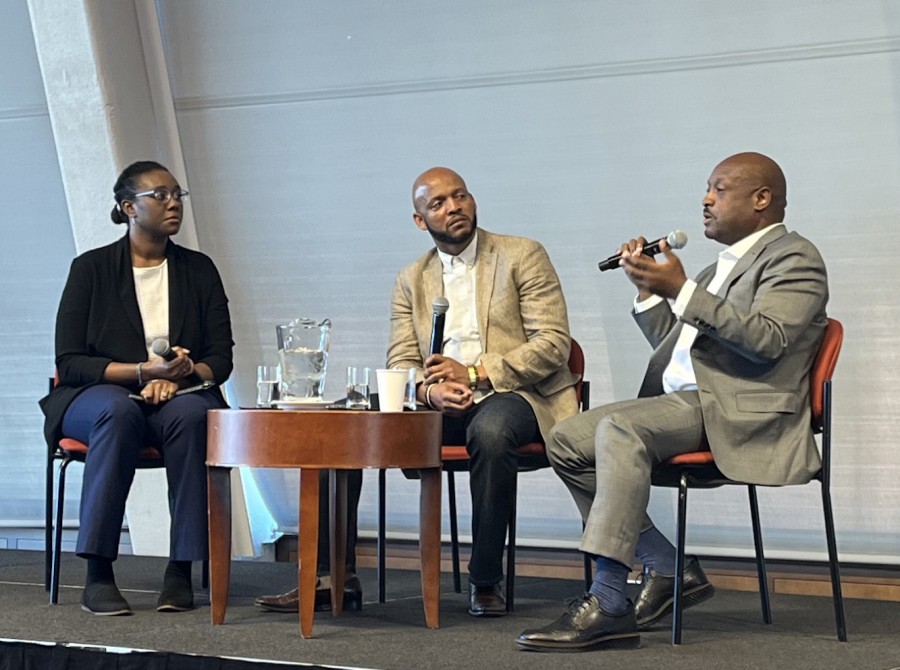Tampa Bay Times reporter discusses Pulitzer-winning investigation at NYU panel
An investigative reporter at the Tampa Bay Times spoke at NYU about his award-winning investigation of a lead factory and the ensuing fallout.
From left to right: Jauna Vitale, Fareed Nassor Hayat and Corey Johnson. (Cora Snow for WSN)
April 14, 2023
Former Tampa Bay Times journalist Corey Johnson spoke to around 50 NYU students and faculty about his Pulitzer Prize-winning investigation into a lead smelter in Tampa, along with the intersections between journalism, justice and sustainability, at a panel event Wednesday evening. He was joined by Jauna Vitale, the assistant director of NYU’s Office of Sustainability, and Fareed Nassor Hayat, a law professor at The George Washington University.
In 2021, Johnson co-authored an 18-month investigation for the Tampa Bay Times that uncovered a pattern of dangerous and unethical practices at a Tampa lead smelter that endangered the health of the plant’s workers and the surrounding community. The series of articles, titled “Poisoned,” won the Pulitzer Prize for investigative reporting. His work led to a federal investigation of the plant and a lawsuit filed by dozens of workers.
“We never used the word ‘conspiracy’ in the text,” Johnson, who now works for the investigative journalism nonprofit ProPublica, said. “But this was a conspiracy. This was well known by a few people at the top of the plant, and we were able to get, essentially, about 10,000 to 20,000 emails going over a span of 12 years that showed what they knew, when they knew it.”
Johnson said that the company that owned the plant, Gopher Resource LLC, also owned and operated a lead smelter in Eagan, Minnesota. However, while the location in Tampa was filled with toxic dust clouds of lead and other poisons, the Eagan location was kept clean.
The reporter said it was clear that racism influenced the company’s mistreatment of its Tampa workers, despite this not being explicit in the published investigation. He noted that while the majority of workers at Eagan were white and unionized, most of those in Tampa were Black, often uneducated, immigrants or ex-convicts who desperately needed the work.
“It was clear then that there was a clear disparity, that the company knew how to run a clean plant, but they were choosing to do it differently in the space of Tampa, where the workers were a different hue,” Johnson said.
Vitale said that sustainability and accountability are closely intertwined. She added that many systems meant to hold companies like Gopher Resource accountable often fail to protect minorities and those in poverty.
“There are multiple systems that are failing, that allow people to be impacted in multiple ways,” Vitale said. “So my thought goes to the community that’s surrounding the factory.”
Correction (April 18): A previous version of this article misstated reporter Corey Johnson’s current place of employment. He was formerly an employee of the Tampa Bay Times, but now works at the investigative journalism nonprofit ProPublica. The article has been updated to reflect this correction. WSN regrets the error.
Ania Keenan contributed reporting. Contact Cora Snow at [email protected].

























































































































































